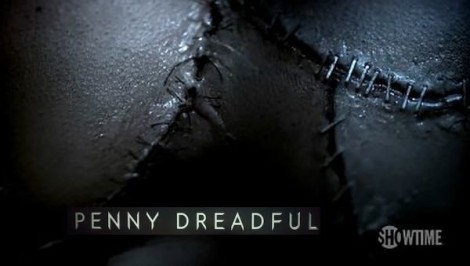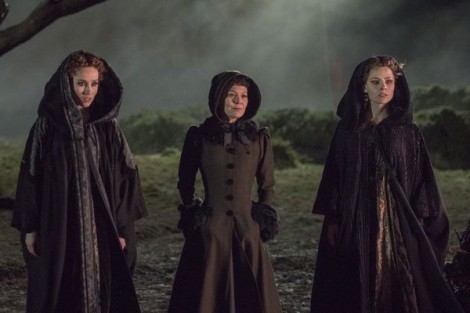For the second time in its so-far 11 aired episodes, Penny Dreadful takes a break from the main narrative to dive into the past of Eva Green’s Vanessa Ives. Last season gave us “Closer Than Sisters,” an ode to the epistlatory format of Dracula, while answering many of the questions the first four episodes. This one comes early in the season and although it does explain one element, it raises a host of questions about where the show is going.
“The Nightcomers” dives head-first into the witching hour, concerning itself with “all those sacred midnight things…” as the Cut-Wife of Ballantrae Moor would say. The Cut-Wife (Patti Lupone) is a witch, sought out by Vanessa to better understand her supernatural abilities. Her skills on the show have been a mix of skilled but minor psychic moves, and the occasional raw strength from when the demon inside her gets out. Probably the most shocking line of the night comes from the Cut-Wife declaring matter-of-factly that Vanessa is not “full human kind.” This episode seems to fit in just before the final flashback from “Closer Than Sisters,” where Vanessa showed up at Sir Malcolm’s (Timothy Dalton) door to search for his missing daughter Mina. Thanks to the Cut-Wife, or Joan Clayton as she finally reveals her name, Vanessa’s natural talents get some training, and she understands her unnatural issues better.
The other big reveal comes from Evelyn Poole’s (Helen McCrory) unexpected appearance in the flashbacks. It turns out her interest in Miss Ives goes back before they met at a séance, even if neither knew the identity of the other at the time. It turns out that Poole is at least much older than she appears, and her power indeed comes from a deal with Lucifer. She’s not just a casual Satanist, she’s fully committed. Poole and her coven, unable to stop Clayton on their own, manipulate the locals into an old-fashioned “burn the witch” movement. Granted, it was through chaining her on a tree instead of burning at the stake, but seeing peasants marching on the supernatural with pitchforks and torches was a Gothic delight, even if it was a sad scene.
Last week’s episode was a change of pace for the show, with the first half being more Dickensian than Gothic. It dived into the underbelly of Victorian London, showing the poor and sick that society didn’t want to see. In a way, Penny Dreadful‘s always been about what’s happening behind the closed doors of Victorian gentlemen and ladies, but that was the first time it dived into the criticism of urban decay. This week took the action out to the countryside, away from the more eclectic and forward city. And oh how it dived into it. Riled up by the fear of the unknown, we get to see the residents of the village at their worst. They show misogyny, an anti-Irish sentiment, and blind devotion to the rich man who gives them work and yet profits excessively from their labor while they toil away. The rich of the era were not ones to share, and Sir Geoffrey Hawkes (Ronan Vibert) has no interest in even holding onto that idea. He’s a greedy man, and a powerful one.
Brian Kirk took over the directing chair after James Hawes’ first two episodes, and the subtle changes in style work. The opening sequence on the moor — one that Sir Henry Baskerville would be jealous of — are stark. The camera cuts quickly, there’s no movement, just cold isolation. It’s a big contrast from the sweeping and lush visuals the show usually relies on. It works well though, when Clayton and Vanessa have their first real conversation. Vanessa is overwhelmed and shaking, struggling to get words out from the pain of her possession, while Clayton is terse, spitting out rapid and quick words in a jarring way.
However, for an episode dedicated to the witching hour, it might be the least-scary installment of the show. There’s no real horror to speak of. Moments of unease, sure. The closest moments to frights come from Poole slaughtering cattle while traipsing through their pasture — McCrory continues to elevate Poole from camp to mesmerizingly evil, and she is delightful — and the final witch-burning. Well, not even the burning, just one shot of Clayton’s white eyes staring out from an oil-covered face. The change of pace isn’t bad, but just odd. John Logan continues to write incredible dialogue and the pacing on the show is wonderful, but this episode is something of an anomaly.
But the pause in the narrative the episode provides means it’s time to look at where the narrative is going. Season one was its own weird adaptation of Bram Stoker’s Dracula, with some other Gothic characters worked in. It also set up a strong Egyptian mythology element, with the gods Amunet and Amun-Ra trying to come together through hosts (of which, Vanessa was an intended one thanks to her body already being home to a demonic spirit, and it’s highly likely that the soulless Dorian Gray is another), which would doom the world. The vampires, or at least the “Master” vampires, were covered in Egyptian hieroglyphs and seemed to follow an even greater master. Dracula himself never showed up, although it’s clear from the backstory on Mina Murray’s disappearance that she met a vampire able to pass for a “gentleman,” rather than the Orlok-like “Master” vampires. So, even as this season premiere featured Sir Malcolm standing over his daughter’s grave, Count Dracula himself is still out there.
And yet, this season there are no hints to the Egyptian element. Even Ferdinand Lyle, the camp Egyptologist, is so far used for his knowledge of dead languages, not his expertise. This now puts the second episode, “Seance” into a new light. And, does it make sense? Because that was the introduction to Lyle and Poole and set-up a lot. A deleted scene from the season one finale implied that the two are members of the Amunet & Amun-Ra cult. In “Seance,” Poole’s medium skills quickly get overwhelmed as Vanessa (well, the Devil inside Vanessa, plus Amunet) takes over. So, was the entire seance a set up and con? The cult (and vampires) wanted Vanessa to become a vessel. Does Poole now want her dead, or the same goal? Was the seance to try to bring out Amunet to permanently possess Vanessa? Considering the importance the show placed on the Egyptian element so far, it would be strange to see it cut out.
“The Nightcomers” isn’t a bad episode by any means — Eva Green gives award-worthy performances each week, and this is one of her best, that alone makes it entertaining — but the narrative pause the direction it takes the show in is worth analyzing. The last time the show dived into the past, it gave us answers, not questions. Perhaps the next episode will be a course-correction and work the revelations into the narrative in a clear way. Logan’s been excellent at juggling the narrative threads so far, so one can hope he knows what he’s doing. Until the next hour of midnight things and Eva Green.
For more of Nicholas Slayton’s Penny Dreadful reviews:
Nicholas Slayton is a journalist and writer who has contributed to the Atlantic, the Wire, io9, Comics Bulletin and more. You can follow him on Twitter @NSlayton





Leave a Reply